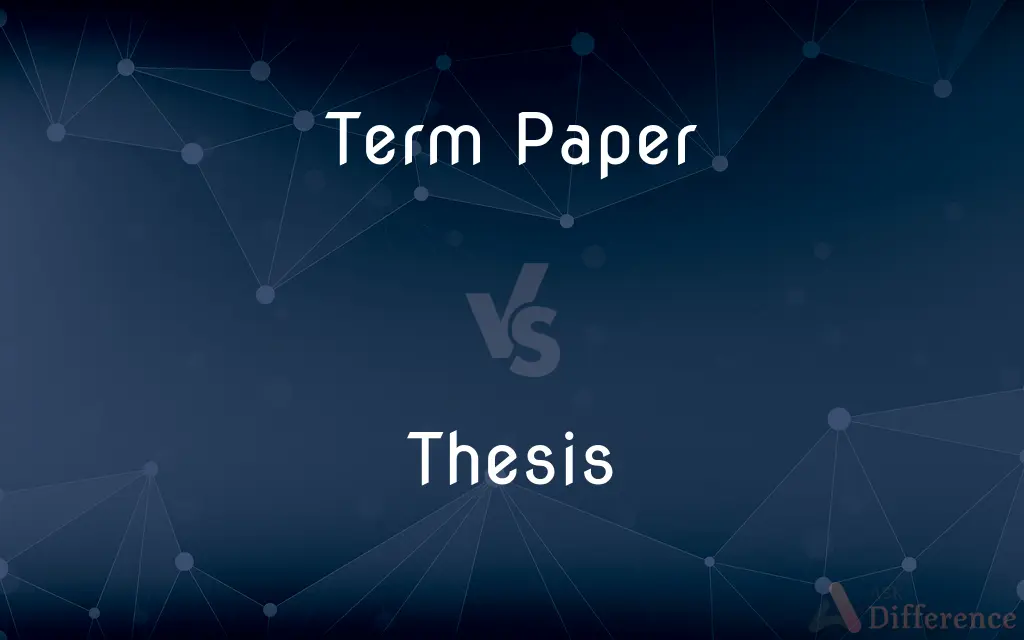Term Paper vs. Thesis — What's the Difference?
By Tayyaba Rehman & Maham Liaqat — Published on February 28, 2024
A term paper is a research assignment typically completed at the end of a semester, focusing on a specific topic within a course, while a thesis is a comprehensive document that presents the research and findings of a student's major project.

Difference Between Term Paper and Thesis
Table of Contents
ADVERTISEMENT
Key Differences
Term papers are assigned to students as a way to deepen their understanding of a particular aspect of their coursework. They require students to conduct research on a topic, analyze information, and present their findings in a structured format. In contrast, a thesis is a more significant undertaking that marks the culmination of a graduate student's research in a specific field. It involves identifying a unique problem or question, conducting extensive research, and offering new insights or solutions.
The scope of a term paper is generally limited to topics covered within a single course, aiming to explore a specific issue or question in depth. The research involved is usually secondary, relying on existing literature and studies. On the other hand, a thesis requires primary research, which may include experiments, surveys, or other methodologies to generate original data. The goal is to contribute new knowledge to the field, which is then rigorously reviewed by a committee of experts.
Term papers are typically shorter in length, ranging from a few pages to more than a dozen, depending on the course requirements and level of study. Theses, however, are much longer, often exceeding fifty pages, as they cover the literature review, methodology, research findings, and conclusions in comprehensive detail.
The evaluation process for term papers is straightforward, with the course instructor or a teaching assistant usually responsible for grading. Theses undergo a more complex assessment, involving a thesis committee that evaluates the student's research proposal, progress, and final defense of their work. This process includes presenting the thesis to the committee and defending the research findings in an oral examination.
Both term papers and theses are important academic assignments, whereas the latter is a more critical component of a student's academic and professional development. Completing a thesis demonstrates a student's ability to conduct independent research, contribute to their field, and communicate complex ideas effectively, skills that are highly valued in both academic and professional settings.
ADVERTISEMENT
Comparison Chart
Purpose
To explore a specific topic within a course.
To present original research and findings in a student's field of study.
Scope
Limited to course content.
Broad, aiming to contribute new knowledge to the field.
Research Type
Primarily secondary research.
Primarily primary research.
Length
A few pages to more than a dozen.
Often exceeds fifty pages.
Evaluation
Graded by the course instructor or assistant.
Reviewed by a thesis committee, including a defense.
Compare with Definitions
Term Paper
Relies on existing literature for information.
I cited over twenty sources in my term paper.
Thesis
Extends over several months or years.
I've been working on my thesis for over a year now.
Term Paper
Integral to assessing understanding in a specific course.
The term paper counts for 30% of my final grade.
Thesis
A document submitted in support of candidature for an academic degree.
I'm currently finalizing my thesis on renewable energy solutions.
Term Paper
Completed within a semester.
I spent the last month of the semester working on my term paper.
Thesis
Involves conducting new research to fill a gap in the literature.
My thesis presents a new method for recycling plastics.
Term Paper
A research paper written by students over an academic term.
For my psychology class, I wrote a term paper on cognitive behavioral therapy.
Thesis
Students must defend their findings before a committee.
I'm preparing for my thesis defense next month.
Term Paper
Centers on a specific issue or aspect of the course.
My term paper explores the impact of social media on adolescent self-esteem.
Thesis
Includes a literature review, methodology, results, and discussion.
My thesis is divided into four main sections, covering all aspects of my research.
Thesis
A treatise advancing a new point of view resulting from research; usually a requirement for an advanced academic degree
Common Curiosities
How long does it take to complete a thesis compared to a term paper?
A term paper can be completed within a semester, while a thesis requires several months to years of research and writing.
Who writes term papers and theses?
Term papers are written by undergraduate or graduate students, while theses are typically written by master's or doctoral candidates.
Is the research for a thesis always original?
Yes, a thesis requires original research that contributes new knowledge or insights to the field.
Can a term paper lead to a thesis topic?
Yes, insights gained during the research for a term paper can inspire a more in-depth investigation that evolves into a thesis topic.
Do both term papers and theses require a proposal?
Theses often require a detailed proposal; term papers usually do not, though some courses may ask for a brief outline.
What happens if a thesis is not approved by the committee?
If a thesis is not approved, the student may need to revise their work and resubmit or, in some cases, choose a new topic and start over.
Is it possible to fail a thesis defense?
Yes, but it's rare. Most students are allowed to make revisions if their thesis initially falls short of the committee's standards.
Can the findings of a thesis have real-world applications?
Yes, many theses aim to address real-world problems or gaps in academic research, and their findings can contribute to policy changes, innovation in practices, or further academic study in the field.
Are there specific formatting requirements for term papers and theses?
Both term papers and theses have formatting requirements, but those for theses are usually more stringent and detailed, often following specific guidelines set by the university or academic department, including citation style, margin sizes, and structure.
Can term papers be published?
While less common, exceptional term papers can be published in academic journals or presented at conferences, often with revisions.
How are term papers and theses graded?
Term papers are graded by course instructors, while theses undergo a defense process before a committee that provides a final evaluation.
What skills are developed through writing a thesis?
Writing a thesis develops research, analytical, writing, and critical thinking skills, as well as discipline-specific knowledge.
What role does the faculty advisor play in the thesis process?
The faculty advisor guides the student through the thesis process, from topic selection and proposal writing to research methodology and final defense preparation, offering expertise and feedback to ensure the thesis meets academic standards.
How does the choice of topic differ between term papers and theses?
Term paper topics are often selected from a list provided by the instructor or must be related to the course content, whereas thesis topics are chosen by the student and must be approved by a faculty advisor, reflecting a higher degree of personal interest and academic relevance.
How do term papers and theses contribute to a student's academic and professional development?
Writing a term paper enhances research, writing, and analytical skills within a specific course context, preparing students for more complex research projects. Completing a thesis develops a deeper level of expertise in a subject area, independent research skills, and project management, which are valuable in both academic and professional settings.
Share Your Discovery

Previous Comparison
Albacore Tuna vs. Chunk Light Tuna
Next Comparison
Nike Air Zoom vs. Adidas Ultra BoostAuthor Spotlight
Written by
Tayyaba RehmanTayyaba Rehman is a distinguished writer, currently serving as a primary contributor to askdifference.com. As a researcher in semantics and etymology, Tayyaba's passion for the complexity of languages and their distinctions has found a perfect home on the platform. Tayyaba delves into the intricacies of language, distinguishing between commonly confused words and phrases, thereby providing clarity for readers worldwide.
Co-written by
Maham Liaqat









































